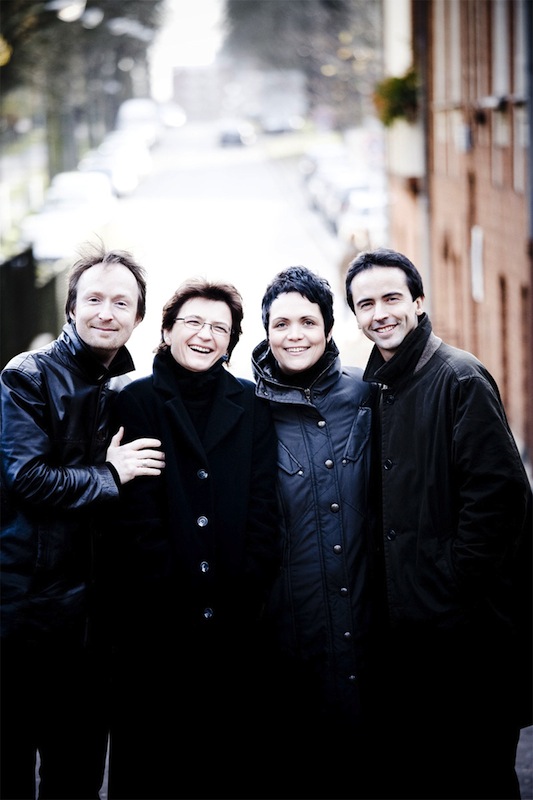Arcanto Quartet displays high-caliber artistry at Mandel Hall

Attending the Arcanto Quartet’s performance at Mandel Hall Friday night after hearing early reports of the atrocities taking place in Paris, one could not help but remember Leonard Bernstein’s response to President Kennedy’s assassination on November 22, 1963, another bloody Friday in history: “This will be our response to violence: to make music more beautifully, more intensely, more devotedly than ever before.” The refinement and high caliber of the Arcanto’s performance, given under the auspices of University of Chicago Presents, suggested its members might have been heeding Bernstein’s invocation.
The program opened with three selections from Bach’s The Art of the Fugue. Bach’s manuscript is notoriously devoid of performance details. The composer did not indicate which instrument(s), if any, he intended to perform the contrapuntal studies, much less any dynamic markings or other guidelines. The Arcanto Quartet opted for a judicious less-is-more interpretative approach.
Their nonfussy rendering to the opening Contrapunctus 1 was keenly attuned to the music’s harmonic motion, the four members modulating their intensity in accordance with the music’s drama. Such harmonic sensitivity was brought to bear in the dotted-rhythm Contrapunctus 2, the ensemble’s timbre blossoming in the study’s forays into major. Contrapunctus 9, a fugue at the twelfth, was fleet and pristine. Vibrato was minimally and tastefully deployed throughout, though repeated fluctuations in the stage lighting were a serious distraction.
Schumann’s String Quartet in A Minor, Op. 41 No. 1, followed, with the interwoven lines of its introductory Andante espressivo immediately making apparent a connection to Bach. The Arcanto Quartet’s four members—violinists Antje Weithaas and Daniel Sepec, violist Tabea Zimmermann, and cellist Jean-Guihen Queyras—possess a most flexible collective instrument, and together they imbued the first movement’s Allegro with sensitive rubato and persuasive dynamic contrast. The obsessive Scherzo was maniacal yet impeccably controlled, and the soaring melody that opened the Adagio seemed endless on first violinist Weithaas’ bow. The propulsive Presto was a clinic in incisive articulation, yet its highlight was the luminous sonority the quartet achieved in the movement’s hushed transition into the coda.
Smetana’s String Quartet No. 1 in E Minor, “From my Life,” constituted the second half. Zimmermann’s delivery of the opening viola solo was incendiary, though the Allegro vivo appassionato as a whole came off as a bit restrained for a movement meant to depict the composer’s youthful infatuation with art. The ensuing Allegro moderato à la Polka was playfully idiomatic, with a charming lilt and delayed downbeats, its tentative contrasting sections evoking a childlike innocence. Cellist Queyras’ solo that launched the Largo sostenuto was convincingly ardent, and the anguished outbursts that punctate the generally lyrical movement conveyed the composer’s pangs at the early death of his wife.
The closing Vivace was ebullient and emphatic, its second theme a vigorous dance that in the Arcanto’s performance made a listener feel Smetana’s enthusiasm at having found his nationalist compositional voice. Weithaas shrieked the piercing high E that shatters the movement’s merriment, which had the desired effect; the music attempted to reconstitute itself, the earlier movements’ themes returning in fragmentary forms, but could not. It faded away in three dying pizzicato chords, each softer than the last, resonant and leveling in the Arcanto members’ hands.
Unfortunately, within seconds of the coda, while the players’ bows were still hovering in the air, a deafening thud of something heavier than a program falling to the floor shattered the mood.
University of Chicago Presents’ next concert takes place November 20 at 7:30 p.m. at the Logan Center for the Arts, where keyboardist Kristian Buzuidenhout will perform works of C.P.E. Bach and Mozart at the fortepiano. chicagopresents.uchicago.edu/
Posted in Performances

